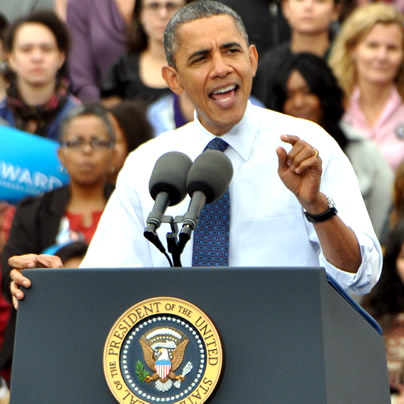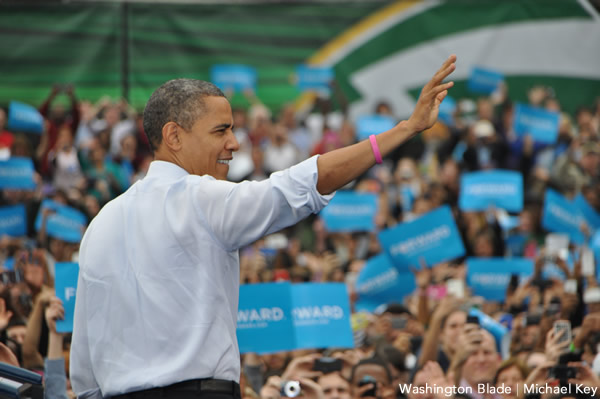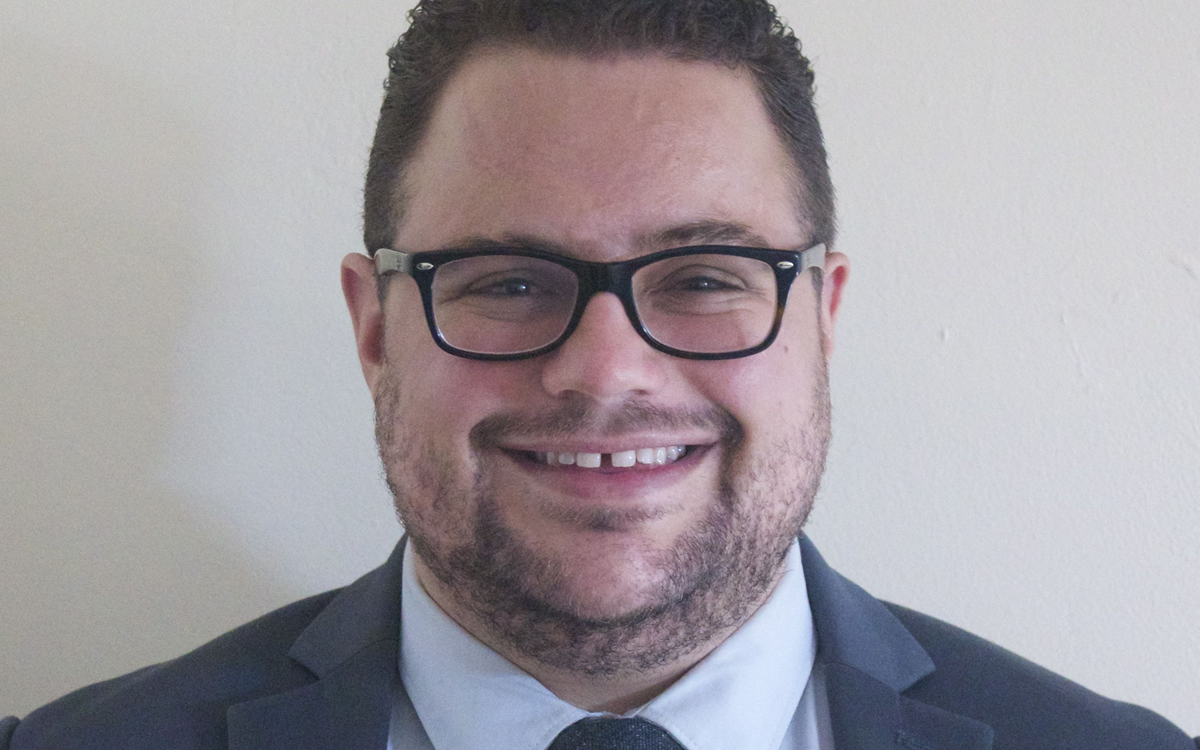National
Election results bolster state marriage fights
Rhode Island, other states expected to debate issue in 2013


Polls show President Obama’s same-sex marriage support did not hurt him among voters. (Washington Blade photo by Michael Key)
Same-sex marriage advocates contend the Nov. 6 election results have given them additional momentum to fight for nuptials for gays and lesbians in their respective states.
Ray Sullivan, campaign manager of Marriage Equality Rhode Island, the group fighting for marriage rights for same-sex couples there, noted to the Washington Blade in a post-Election Day interview the General Assembly will have “more pro-equality legislators seated than ever in history” in 2013.
Gay House Speaker Gordon Fox, who sparked controversy in 2011 when he endorsed a civil unions bill because of a lack of support in his chamber for a marriage measure, has pledged to call a vote on a proposal that would allow nuptials for gays and lesbians in the state before the end of January. The Rhode Island chapter of the American Civil Liberties Union noted in May only 52 couples had obtained civil union licenses since the state’s civil union took effect in July 2011.
Gov. Lincoln Chafee signed an executive order earlier this year mandating state agencies to recognize same-sex marriages legally performed in neighboring Massachusetts, Connecticut and other states. He has also publicly backed marriage rights for same-sex couples, even though he reluctantly signed the controversial 2011 civil unions bill into law.
“There is this sense that finally in Rhode Island it’s not a matter of if, but when,” said Sullivan, who noted MERI and other advocates could focus on building additional support for the same-sex marriage bill in the state Senate if it passes in the House. “The results from last Tuesday both here and throughout the country represent quite frankly ground-shifting momentum for the pro-equality effort. Our focus and our jobs will be to capitalize on that momentum, reaffirm the support we already have, work with this record [majority and] finally make 2013 the year that we get this done.”
Voters in Maine, Maryland and Washington on Election Day approved referenda that either extended nuptials to gays and lesbians or upheld their state’s same-sex marriage laws. Minnesotans also rejected a proposed state constitutional amendment that would have defined marriage as between a man and a woman.
Minnesota Gov. Mark Dayton, who supports nuptials for gays and lesbians, is among those who spoke out against Amendment 1.
Delaware Gov. Jack Markell, who signed his state’s civil unions bill into law in May 2011, raised eyebrows in August when he suggested to the Huffington Post state lawmakers could debate a same-sex marriage bill as early as next year.
Garden State Equality Chair Steven Goldstein expressed confidence in a post-Election Day statement New Jersey’s Democratic-controlled state legislature will override Gov. Chris Christie’s veto of the same-sex marriage bill lawmakers approved earlier this year. The state does not have a referendum or initiative process, but Goldstein stressed his group remains opposed to the idea of allowing voters to consider marriage rights for gays and lesbians at the ballot.
“The majority should never vote on the civil rights of a minority, period,” he said.
Same-sex marriage advocates in other states are poised to implement a different strategy.
Basic Rights Oregon has launched an online campaign designed to bolster support for a 2014 ballot measure that would overturn the state’s constitutional amendment that defines marriage as between a man and a woman. Oregon would become the first state in the country to overturn such a ban if voters support the referendum.
“As more and more Americans are having conversations with gay and lesbian friends and family about why marriage matters, they’re coming to realize that this is not a political issue: This is about love, commitment and family,” reads the appeal. “We know that we are on the right path. Our outreach, just like that of the states who [have won] the freedom to marry is winning hearts and minds.”
Rick Sutton, executive director of Equality Indiana Action, which opposes a proposed state constitutional amendment that would ban marriage for same-sex couples that is expected to go before voters in 2014, told the Blade his group has already looked to the campaign that defeated Minnesota’s Amendment 1 for guidance.
“It’s pretty clear to me to win an amendment like that — there’s was very similar to what ours will likely be — you have to have a pretty broad coalition of businesses, faith community, labor, retired folks, the whole gamut,” said Sutton. He noted WellPoint, the Simon Property Group and other Indiana-based corporations have already spoken out against the proposed amendment. “It will be difficult to attract and retain top quality scientists and engineers, particularly younger ones, who just don’t think this is something government should be getting involved with. They’re concerned about their future workforce.”
An ABC News/Washington Post poll released on Nov. 14 indicates 51 percent of Americans support marriage rights for same-sex couples. A Gallup poll conducted shortly after President Obama publicly endorsed marriage rights for same-sex couples noted 60 percent of respondents said his position on the issue would not influence whether they would support or oppose his re-election bid.
“What happened I think with this election is that it’s taken away the argument from our opponents that when legislators are forced to vote to affirm the right of same-sex couples to marriage equality, the popular sentiment is on the opposite side,” Equality Illinois CEO Bernard Cherkasov told the Blade.
Lambda Legal and the ACLU of Illinois on May 30 filed lawsuits against the Cook County Clerk’s office on behalf of 25 same-sex couples. Attorney General Lisa Madigan and Cook County State’s Attorney Anita Alvarez have both said they support the litigation, while Cook County Clerk David Orr and Chicago Mayor Rahm Emanuel are among those who support marriage rights for same-sex couples.
More than 4,800 same-sex couples have taken advantage of the state’s civil unions law since it took effect in July 2011, but Cherkasov said the election results confirm “there’s popular support for marriage equality.”
“Lawmakers should follow suit and actually grant marriage equality to gay and lesbian couples in loving, committed relationships,” he said. “We intend to carry that message to our lawmakers in Illinois.”
Sutton agreed as he discussed Obama’s evolution on the successful same-sex marriage referenda in Maine, Maryland and Washington on Election Day.
“National momentum is there,” he said. “The time has come for the other side to realize where they are. They won’t give up quietly. Their argument never changes. It’s always the same, and we’re ready for that. We’re absolutely ready.”
U.S. Supreme Court
Supreme Court to hear Md. religious freedom case on Tuesday
Advocacy groups to rally outside during Mahmoud v. Taylor oral arguments

Activists on Tuesday will hold a rally in front of the U.S. Supreme Court as the justices hear oral arguments in a case that will determine whether schools are violating parents’ religious freedom by not letting them opt their children out of learning about LGBTQ-specific topics.
Mahmoud v. Taylor is a case out of Montgomery County about parents who wish to opt their children out of LGBTQ-themed lessons in public schools for religious reasons.
Montgomery County Public Schools, after initially allowing parents to opt their children out, changed the policy in March 2023.
The plaintiffs — Tamer Mahmoud, Enas Barakat, and other parents — argue “the storybooks were chosen to disrupt ‘cisnormativity’ and ‘either/or thinking’ among students.”
“The board’s own principals objected that the curriculum was ‘not appropriate for the intended age group,’ presented gender ideology as ‘fact,’ ‘sham[ed]’ students with contrary opinions, and was ‘dismissive of religious beliefs,’” according to the petition on the Supreme Court’s website.
The petition goes further, saying the parents are “not challenging the curriculum, but arguing that compelling their elementary-age children to participate in instruction contrary to their parents’ religious convictions violated the Free Exercise Clause. Construing Wisconsin v. Yoder, the 4th Circuit found no free-exercise burden because no one was forced ‘to change their religious beliefs or conduct.’”
The Coalition for Inclusive Schools and Communities, an organization that aims to bring together “advocates, educators, families, and organizations committed to inclusive, affirming, fact and science-based education,” will participate in the “Rally for Inclusive Education” rally outside the Supreme Court alongside Live In Your Truth and the Montgomery County Pride Family.
“Inclusive education isn’t just a value — it’s a necessity,” said Phillip Alexander Downie, co-chair of the Coalition for Inclusive Schools and Communities and CEO of Montgomery County Pride Family. “The right of every child to learn in an environment where they see themselves reflected, affirmed, and respected is under attack. This rally is our moment to protect that right — and ensure future generations inherit classrooms rooted in truth, equity, equality, and justice.”
The Coalition for Inclusive Schools and Communities says the rally is a “nonpartisan community gathering rooted in education, advocacy, and solidarity.”
“The focus of this event is to uplift the importance of inclusive learning environments, celebrate the power of diversity in our schools, and amplify the voices of those most impacted by exclusionary practices and rhetoric,” it said.
The rally will feature speakers from across the country, including students, educators, civil rights leaders, and authors who will give their own testimonies as to why it is important to have inclusivity in primary education. Trans Maryland, the National Women’s Law Center, MoCoPride Center, and Authors Against Book Bans are among the LGBTQ groups sponsoring the event.
National
EXCLUSIVE: Rodrigo Heng-Lehtinen to step down from Advocates for Trans Equality
A4TE formed last year when two transgender rights groups merged

Advocates for Trans Equality Executive Director Rodrigo Heng-Lehtinen on Monday announced he will step down on April 30.
The Transgender Legal Defense and Education Fund and the National Center for Transgender Equality formed Advocates for Trans Equality last year when they merged. Heng-Lehtinen was previously NCTE’s executive director.
“Now that we’ve made it through the merger, and A4TE is established as a new, prominent institution fighting hard for trans equality, it’s time for me to take my next step,” said Heng-Lehtinen in a press release that Advocates for Trans Equality sent exclusively to the Washington Blade. “When Andy (Hong Marra) and I began envisioning the merger, I committed to seeing it through. I’m proud that now our vision has been realized. A4TE has not just launched, but is fully up and running, delivering results for trans people around the country. With A4TE gaining momentum, I’m now ready to move on to my next chapter.”
Heng-Lehtinen, whose mother is former Florida Congresswoman Ileana Ros-Lehtinen, in the press release stressed he “will be focusing on changing hearts and minds.”
“With my background in persuasion and messaging, it’s where I can make the biggest difference, and what I feel called to return to in this era of anti-trans backlash,” said Heng-Lehtinen. “I will still be fighting shoulder-to-shoulder with everyone (in) the trans movement, simply in a different capacity.”
Marra, who is Advocates for Trans Equality’s CEO, praised Heng-Lehtinen and said the organization’s work will continue.
“We thank Rodrigo for his years of dedicated leadership and service,” said Marra. “A4TE will continue to deliver on our promise to advocate for the lives of trans people who need us now more than ever. We remain undaunted by our endeavor to ensure trans people and our families are no less than free and equal and treated with dignity and respect.”
Louisiana Trans Advocates Executive Director Peyton Rose Michelle also praised Heng-Lehtinen.
“Rodrigo has been a steady hand and a bright light in this work,” she said. “He’s someone who shows up with integrity, kindness, and a deep commitment to meeting this political moment with courage. I’ve always felt deeply supported and heard by him, which is something I value deeply.”
“I fully support him as he steps into this new chapter, and I know his clarity of vision and heart-forward leadership will keep shifting this landscape back toward justice for trans people, and therefore, all people,” added Michelle.
U.S. Federal Courts
Federal judge blocks Trump passport executive order
State Department can no longer issue travel documents with ‘X’ gender markers

A federal judge on Friday ruled in favor of a group of transgender and nonbinary people who have filed a lawsuit against President Donald Trump’s executive order that bans the State Department from issuing passports with “X” gender markers.
The Associated Press notes U.S. District Judge Julia Kobick in Boston issued a preliminary injunction against the directive. The American Civil Liberties Union, which represents the plaintiffs, in a press release notes Kobick concluded Trump’s executive order “is likely unconstitutional and in violation of the law.”
“The preliminary injunction requires the State Department to allow six transgender and nonbinary people to obtain passports with sex designations consistent with their gender identity while the lawsuit proceeds,” notes the ACLU. “Though today’s court order applies only to six of the plaintiffs in the case, the plaintiffs plan to quickly file a motion asking the court to certify a class of people affected by the State Department policy and to extend the preliminary injunction to that entire class.”
Former Secretary of State Antony Blinken in June 2021 announced the State Department would begin to issue gender-neutral passports and documents for American citizens who were born overseas.
Dana Zzyym, an intersex U.S. Navy veteran who identifies as nonbinary, in 2015 filed a federal lawsuit against the State Department after it denied their application for a passport with an “X” gender marker. Zzyym in October 2021 received the first gender-neutral American passport.
The State Department policy took effect on April 11, 2022. Trump signed his executive order shortly after he took office in January.
Germany, Denmark, Finland, and the Netherlands are among the countries that have issued travel advisories for trans and nonbinary people who plan to visit the U.S.
“This ruling affirms the inherent dignity of our clients, acknowledging the immediate and profound negative impact that the Trump administration’s passport policy would have on their ability to travel for work, school, and family,” said ACLU of Massachusetts Legal Director Jessie Rossman after Kobick issued her ruling.
“By forcing people to carry documents that directly contradict their identities, the Trump administration is attacking the very foundations of our right to privacy and the freedom to be ourselves,” added Rossman. “We will continue to fight to rescind this unlawful policy for everyone so that no one is placed in this untenable and unsafe position.”
-

 State Department4 days ago
State Department4 days agoHIV/AIDS activists protest at State Department, demand full PEPFAR funding restoration
-

 Brazil4 days ago
Brazil4 days agoUS lists transgender Brazilian congresswoman’s gender as ‘male’ on visa
-

 Federal Government5 days ago
Federal Government5 days agoWhite House sues Maine for refusing to comply with trans athlete ban
-

 District of Columbia4 days ago
District of Columbia4 days agoCapital Pride wins $900,000 D.C. grant to support WorldPride










